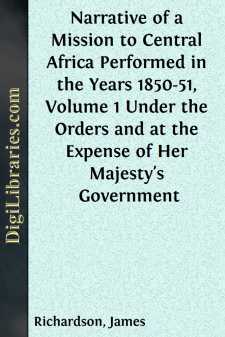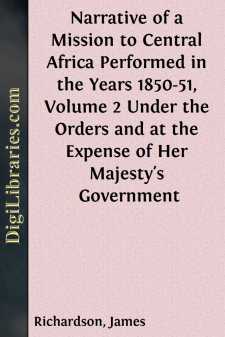Categories
- Antiques & Collectibles 13
- Architecture 36
- Art 48
- Bibles 22
- Biography & Autobiography 813
- Body, Mind & Spirit 142
- Business & Economics 28
- Children's Books 16
- Children's Fiction 13
- Computers 4
- Cooking 94
- Crafts & Hobbies 4
- Drama 346
- Education 46
- Family & Relationships 57
- Fiction 11829
- Games 19
- Gardening 17
- Health & Fitness 34
- History 1377
- House & Home 1
- Humor 147
- Juvenile Fiction 1873
- Juvenile Nonfiction 202
- Language Arts & Disciplines 88
- Law 16
- Literary Collections 686
- Literary Criticism 179
- Mathematics 13
- Medical 41
- Music 40
- Nature 179
- Non-Classifiable 1768
- Performing Arts 7
- Periodicals 1453
- Philosophy 64
- Photography 2
- Poetry 896
- Political Science 203
- Psychology 42
- Reference 154
- Religion 513
- Science 126
- Self-Help 84
- Social Science 81
- Sports & Recreation 34
- Study Aids 3
- Technology & Engineering 59
- Transportation 23
- Travel 463
- True Crime 29
Narrative of a Mission to Central Africa Performed in the Years 1850-51, Volume 1 Under the Orders and at the Expense of Her Majesty's Government
by: James Richardson
Description:
Excerpt
CHAPTER I.
Origin of the Missions—Its Objects and Plan—Preparations—Arrival at Tripoli—Prussian Colleagues—Necessary Delay—The Boat for Lake Tchad—Wind-bound—Anxieties at Tripoli—Correspondence with Mourzuk and Ghât—Circular Letter of Izhet Pasha—Composition of the Caravan—An aristocratic Interpreter—A Mohammedan Toper—The Chaouches—Free Blacks returning to their Countries—Marabout—Camel-drivers—Rate of Desert travelling—Trade of Tripoli with the Interior—Slavery—Caravans from Central Africa—Details on Commerce—Promotion of legitimate Traffic—Spread of Civilisation.
Since my return from a first tour of exploration in the Great Sahara I had carefully revolved in my mind the possibility of a much greater undertaking, namely, a political and commercial expedition to some of the most important kingdoms of Central Africa. The plan appeared to me feasible; and when I laid it in all its details before her Majesty's Government, they determined, after mature consideration, to empower me to carry it out. Two objects, one principal, necessarily kept somewhat[2] in the background—the abolition of the slave-trade; one subsidiary, and yet important in itself—the promotion of commerce by way of the Great Desert; appeared to me, and to the distinguished persons who promoted the undertaking, of sufficient magnitude to justify considerable sacrifices. Much preliminary discussion took place; but the impediments and difficulties that naturally start up at the commencement of any enterprise possessing the character of novelty were gradually overcome, and in the summer of 1849 it was generally known that I was about to proceed, by way of Tripoli and the Sahara, and the hitherto unexplored kingdom of Aheer, to endeavour to open commercial relations and conclude treaties with any native power so disposed, but especially with the Sultan of Bornou. It was not thought necessary, however, to surround my Mission with any circumstances of diplomatic splendour; and it was still in the character of YakÐâ¦ÐÐb—a name already known throughout the greater portion of the route intended to be traversed—that I proposed to resume my intercourse with the Moors, the Fezzanees, the Tibboos, the Tuaricks, and other tribes and peoples of the desert and the countries beyond.
The various preparations for the expedition occupied a considerable time before I could leave Europe; but I shall pass over all account of these, and enter as soon as possible on the plain narrative of my journey. We reached Tripoli on January[3] the 31st, 1850, having come circuitously by way of Algeria and Tunis. Divers reasons, on which it is unnecessary to enlarge, had prevented us from adopting a more direct route. However, there had, properly speaking, been no time lost, and we had still to look forward to inevitable delays. An expedition of the kind we were about to undertake cannot be performed in a hurry, especially in Africa. In that continent everything is carried on in a deliberate manner. The climate is in itself suggestive of procrastination; and no one who has there had to do with officials, even of our own country, until he has himself felt the enervating influence of the atmosphere, can fail to have been held in ludicrous suspense between indignation and surprise.
It must here be mentioned that, associated with me in this expedition, were two Prussian gentlemen, Drs. Barth and Overweg, who had volunteered to accompany me in my expedition in the character of scientific observers.
The political and commercial nature of my Mission by no means excluded such auxiliaries. It was desirable that every advantage should be taken of this opportunity to explore Central Africa in every point of view; and when the proposition came to me under the sanction of Chevalier Bunsen, and received the approval of her Majesty's Government, I could not but be delighted. It was arranged that these gentlemen should travel at the expense and[4] under the protection of Great Britain, and that their reports should be duly forwarded to the Foreign Office.
Drs. Barth and Overweg, with European impetuosity, eager at once to grapple with adventure and research, had pushed on whilst I waited for final instructions from Lord Palmerston....






